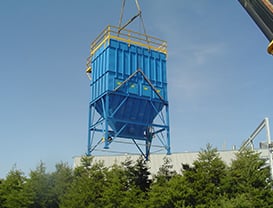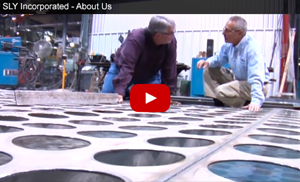Pollution Control: How to Determine if Your Facility Needs a Dust Collector
When some people see the title to this blog, their knee-jerk reaction might be something like, “Wouldn’t it be obvious if I needed a dust collector?” Well, if your employees are gasping for breath due to the amount of dust in the air, then installing a dust collector is an obvious solution, but things aren’t always this clear-cut.
In this blog, we aren’t focusing on facilities that have only recently been created or are in the process of being established. In this case, decisions regarding environmental considerations such as dust collection will almost certainly have been addressed as part of that facility’s design, certification, and commissioning process.
Prepare for the Unexpected
Quite apart from anything else, inspectors will ensure that a new facility is compliant with any appropriate Occupational Safety and Health Administration (OSHA) standards and regulations. The same thing applies to any relevant National Fire Protection Association (NFPA) codes and standards, particularly in the case of processes that produce dust that is combustible and potentially explosive.
Problems may arise, however, in the case of existing establishments. In some cases, managers may decide to raise production levels without considering the increased load on current dust collection capabilities. In other cases, a processing plant may undertake new tasks or start working with new materials that its personnel are unfamiliar with. Yet another situation involves companies operating for a long time and may not be up to date with the latest tools, technologies, codes, and standards. For example, many industrial and engineering companies predate OSHA, which Congress didn’t establish until 1971.
At Sly, we specialize in dust collection solutions. Over the years, we’ve run into many situations where companies were unsure as to whether they needed a dust collector or not. In some cases, they weren’t even thinking about it until something untoward occurred.
Remediating Environmental Pollution and Benefiting the Greater Whole
One such example involves a small magnet company that has been in business for close to 120 years. The shop floor contains many machines that cut, grind, polish, and paint the pieces of metal that are to be magnetized. There wasn’t much official oversight at the time of this firm’s founding, and its operations remained largely unchanged over the years. In fact, wasn’t until the late 2000s that the company discovered it violated several health and safety regulations, one of which was the amount of dust and metal particles in the air.
The current owners acted swiftly to remediate the situation, including deploying a state-of-the-art dust collection solution. Although this may not seem to be too surprising to us now, a recent analysis of the company’s personnel records revealed an unexpected benefit resulting from the addition of the dust collection system, which was substantially fewer workers taking sick days caused by what was, at that time, assumed to be colds, but what in hindsight may well have been respiratory problems caused by inhaling dust and metal particles.
How to Save Money, Time, and Energy with a Dust Collection System
This leads us to an interesting point, which is that most people regard having to install dust collection only in the context of being a financial burden, neglecting to consider the associated benefits, which include (but are not limited to) the following:
- Increases workplace health and safety: If your environment is dust-free, your employees will be healthier and safer.
- Increases productivity: If your environment is dust-free, your employees will be more productive.
- Increases quality: Having a dust-free environment helps you to produce a better-quality product.
- Reduces costs: If your dust collection solution includes recovering valuable materials, then factoring in these recovered materials may reduce the cost of the product.
- Reduces maintenance: The fact that you don’t have to replace your HVAC filters and/or service your HVAC system as often results in significant maintenance cost savings.
Our own company began as a manufacturer of foundry equipment in 1874, which means we’ve been in business for nearly 150 years. The company’s experience with dusty environments led to its development of industrial dust collection equipment. Sly holds the very first patent, issued in 1902, for a cloth-type dust collector. Now, of course, we are industry leaders in all forms of dust collection and mitigation, including dry dust collectors and wet scrubbers.
One of the things we do to keep our fingers on the pulse of things is to constantly monitor what people are saying and what questions they are asking about environmental problems and dust collection. Somewhat surprisingly, our research reveals that one of the most common dust-collection-related questions asked on Google is “Do I need a dust collector?” or something similar like “How can I tell if my factory needs to install dust collection equipment?”
How Do I Know if I Need a Dust Collector?
Some of the more obvious signs that your facility could benefit from the addition of a dust collection system include (but are not limited to) the following:
- You can see, smell, and/or taste the dust in the air.
- Employees are taking excessive sick days for respiratory problems.
- Surfaces and equipment are covered in dust.
- You feel the need to “air out” the facility.
- Your HVAC filters are clogged with dust.
If any of these issues are familiar to you, your next question will probably be, “What type and size (capacity) of dust collector do I need?” Unfortunately, this is where things start to get tricky because many factors must be considered to arrive at the most optimal and cost-effective solution.
Choosing a Dust Collector
Happily, you have us. With our nearly 150 years of experience in air quality control, we know what works and what doesn’t for each application. We can help guide you to the best solution based on whatever kind of dust you’re dealing with, thereby making your workplace safer, healthier, happier, and more productive.
Please feel free to contact us for additional information, reach out to your local Sly representative, or even request a quote. Also, you may find many of our blogs to be of interest, including the following:
Tags: dust collector system



